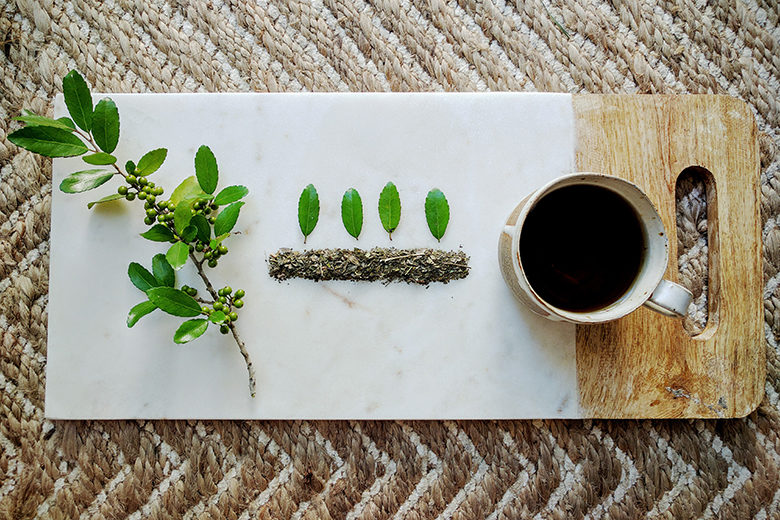
You probably know tea is grown in distant lands: China, Japan, India and Africa. However, did you know that there might actually be tea growing in your own backyard? ![]()
Yaupon is an evergreen holly shrub that is native to the coastal region of Virginia and grows along the coast down to Florida, west to the eastern side of Texas and spreads north to the Ouachita Mountain region of Arkansas. Check out this map from the U.S. Geological Survey to see specifically where yaupon grows.
A relative to the popular South American yerba mate tea, yaupon is the only known leaf in North America to contain caffeine. Yaupon's caffeine content varies based on how it is grown and processed, but it is generally similar to that of green tea or yerba mate.
In 1789, yaupon was given the ill-fated scientific name of Ilex vomitoria, due to its usage in Native American purging rituals. Although its scientific name makes the plant sound unappetizing, current studies have shown no such emetic effect from yaupon leaves. More than 3,000 science-based studies have investigated the health benefits of drinking various teas. Yaupon not only has been shown to have anti-inflammatory properties, it also contains theobromine, chlorogenic acid and coumaric acid.
Foraging for Yaupon
Before foraging for any foods, speak with an expert in foraging in your area. Identifying yaupon shrubs can be simple. Yaupon is a large shrub or understory tree, which means it likes to grow under taller trees. The glossy green leaves grow alternatively on the branch and have round-toothed edges. They can be found growing in maritime forests, along forest edges and dunes, and in swamps.
Yaupon is a dioecious plant, meaning there are male and female shrubs (both can be used to make tea). Only the female plants produce berries that ripen in the late fall to small, shiny red drupes. Yaupon leaves can be harvested year-round to make tea.
Roasting and Brewing Yaupon
I prefer to roast the leaves before making them into tea. It makes for a smokier flavor, similar to yerba mate. After steeping, yaupon tea is full-bodied, refreshing and without the bitterness of yerba mate. Yaupon tastes like a mixture of black tea and yerba mate.
To Roast
- Wash and dry leaves. Lay leaves flat on a baking sheet.
- Roast at 200°F for 30 minutes until leaves darken and become dry and crumbly.
- Use a coffee grinder, food processor or your hands to crumble the roasted leaves. Store tea in an air-tight container.
To Brew
- Measure 1 tablespoon of roasted, crumbled leaves into a brew basket, infuser or mesh tea bag.
- Place tea into 8 ounces of just-boiled hot water. Steep for 5 to 7 minutes. Remove leaves and enjoy.





